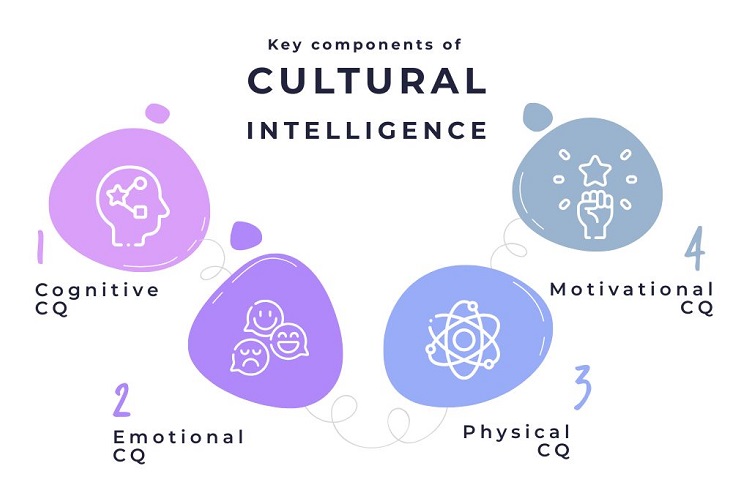Cultural intelligence plays a crucial role in the CQ assessment as it helps individuals develop cross-cultural competence. By measuring one’s cultural intelligence, this assessment evaluates their ability to navigate and adapt effectively in diverse cultural contexts. It allows individuals to assess their strengths and areas of improvement with a view to promoting the active acquisition of knowledge, skills and attitudes which are needed for successful interlinkages.
Cultural intelligence will ultimately allow individuals to overcome cultural differences, foster inclusion and thrive in multicultural environments.
What is Cultural Intelligence?
Cultural Intelligence (CQ) refers to an individual’s ability to effectively function and adapt in diverse cultural contexts. It involves understanding, interpreting, and interacting with people from different cultural backgrounds, including those with distinct values, beliefs, customs, languages, and communication styles.

Cultural intelligence is a multidimensional concept that goes beyond simple cultural awareness. It comprises several key components:
- Cognitive CQ: This aspect involves an individual’s knowledge and understanding of different cultural norms, practices, and values. It includes being aware of cultural similarities and differences and recognizing the influence of culture on behavior and communication.
- Emotional CQ: Emotional CQ relates to an individual’s awareness and management of their own emotions and the ability to empathize with the emotions of others from different cultural backgrounds. It requires an open-minded and non-judgmental approach to understanding different emotional expressions.
- Physical CQ: Physical CQ involves an individual’s ability to adapt effectively to diverse cultural situations, such as understanding appropriate body language, gestures, and personal space boundaries.
- Motivational CQ: This component refers to an individual’s willingness and confidence to engage with people from different cultures. Motivational CQ drives a person to actively seek cross-cultural experiences and learn from them.
Cultural intelligence is essential in today’s globalized world, where individuals frequently encounter diverse cultural settings in their personal and professional lives. People with high cultural intelligence can bridge cultural gaps, build positive relationships, and collaborate more effectively with individuals from different cultural backgrounds.
Importance of cross-cultural competence in today’s globalized world
-
Effective communication
Intercultural competence makes it possible to communicate effectively with people of different cultures. It involves understanding and respecting diverse communication styles, norms, and preferences. By developing cross-cultural competence, individuals can navigate potential language barriers, adapt their communication strategies, enhance their personality traits and foster mutual understanding.
-
Building Relationships
Fostering intercultural competence helps individuals develop and maintain a favorable relationship with persons of other cultural backgrounds. It also involves recognizing and appreciating the cultural diversity, values and beliefs which can help enhance trust, mutual respect and cooperation. Individuals may bridge cultural gaps and strengthen their connections with people of different backgrounds through the development of intercultural competence.
-
Global Business Success
Organisations work in multicultural settings with a variety of clients and partners from around the world. Businesses can better comprehend local market dynamics, tailor their goods and services to fit various cultural contexts, and forge cross-border relationships by demonstrating cross-cultural competency. Organizations can also use it to traverse various legal systems and commercial norms around the world.
-
Conflict Resolution and Collaboration
Cross-cultural competence is vital for managing and resolving conflicts that may arise due to cultural misunderstandings or clashes. It equips individuals with the skills to navigate cultural differences, mediate conflicts, and find mutually beneficial solutions. Moreover, cross-cultural competence fosters collaboration by encouraging diverse perspectives, creativity, and innovation in multicultural teams.
The Development of Cultural Intelligence Assessment
Cross-cultural competency has significantly advanced because of the creation of the Cultural Intelligence Assessment (CQ). CQ tests have developed over time to offer a more thorough knowledge of a person’s cultural intelligence and capacity to work well in a variety of cultural contexts.
The assessment of cultural intelligence dates back to the early 2000s, when academics realized how important it was to gauge a person’s capacity for navigating cultural differences. Theoretically, those with a deeper awareness of many cultures would be better able to adapt and interact with others across cultural boundaries.
Benefits of CQ Assessment:
-
Self-awareness
CQ assessments provide individuals with valuable self-awareness regarding their cultural intelligence strengths and weaknesses. They offer a structured framework for individuals to reflect on their cultural biases, assumptions, and stereotypes. This self-awareness enables individuals to recognize areas for improvement and take proactive steps to enhance their cross-cultural competence.
-
Targeted development
CQ assessments help individuals identify specific areas of cultural intelligence that require development. By understanding the different dimensions, individuals can focus on enhancing particular skills, such as adapting to different cultural contexts, managing cultural differences, or engaging in effective cross-cultural communication. This targeted development approach allows individuals to make meaningful progress in their intercultural effectiveness.
-
Organisational application
CQ assessments can be utilized by organizations to enhance diversity and inclusion efforts. These assessments help identify individuals with high levels of cultural intelligence who can serve as cultural ambassadors or leaders in cross-cultural teams. CQ assessments also provide organizations with insights into areas where training and development programs can be implemented to improve the overall cultural competence of their workforce.
-
Research-based tool
CQ assessments have undergone rigorous research and development, ensuring their reliability and validity. They are grounded in scientific theories and frameworks related to cultural intelligence. As a result, these assessments provide a standardized and objective measure of an individual’s cultural intelligence, making them a valuable tool in assessing and developing cross-cultural competence.
Limitations of CQ Assessment:
-
Cultural bias
CQ assessments may inadvertently incorporate cultural biases that favour certain cultural groups or perspectives. The assessment items and scoring criteria may not adequately capture the nuances of cultural intelligence across different cultures. Care must be taken to ensure that the assessments are culturally fair and sensitive to avoid perpetuating stereotypes or favoring certain cultural norms.
-
Self-reporting biases
CQ assessments rely on individuals’ self-reporting of their cultural intelligence, which can be subject to biases. Individuals may overstate or understate their abilities, leading to inaccuracies in the assessment results. This limitation highlights the need for additional measures, such as observations or feedback from others, to provide a more comprehensive evaluation of an individual’s cultural intelligence.
-
Predictive validity
While CQ assessments provide insights into an individual’s cultural intelligence, their predictive validity in real-world cross-cultural contexts may be limited. It is a complex and dynamic construct influenced by various situational factors. The assessments may not fully capture the ability to apply cultural intelligence effectively in different cultural contexts, which can impact their predictive validity.
-
Individual trait focus
CQ assessments primarily focus on individual traits and characteristics related to cultural intelligence. However, cross-cultural competence is also influenced by contextual factors, such as the nature of the cultural interaction, the cultural norms of the specific context, and the dynamics of the cultural group or team. These contextual factors may not be adequately captured by CQ assessments, limiting their holistic understanding of cross-cultural competence.
Conclusion
CQ assessment plays a vital role in the development of cross-cultural competence. CQ assessments provide individuals with self-awareness, enabling them to identify areas for improvement and develop targeted strategies to enhance their cultural intelligence. These assessments also have organizational applications, promoting diversity and inclusion by identifying culturally competent individuals and guiding training efforts.
Despite limitations such as cultural bias and self-reporting biases, CQ assessments offer valuable insights into individuals’ cultural intelligence. By leveraging CQ assessments alongside other approaches, individuals and organizations can foster cross-cultural competence and effectively navigate diverse cultural contexts in today’s interconnected world.
Mercer | Mettl, a leading Psychometric assessment technology company, plays a significant role in the development of cross-cultural competence through its CQ assessment solutions. Mercer | Mettl offers culturally fair and reliable assessment tools that measure an individual’s cultural intelligence and provide insights for development. These assessments help individuals gain self-awareness, identify strengths and weaknesses, and develop targeted strategies to enhance their cross-cultural competence.
By leveraging Mercer | Mettl’s assessment solutions, individuals and organisations can effectively navigate diverse cultural contexts, promote inclusivity, and foster intercultural effectiveness in today’s globalized world.










